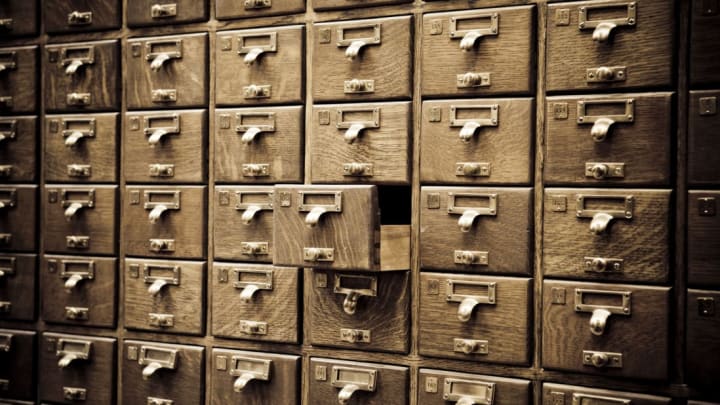Melvil Dewey, the inventor of the Dewey Decimal System, was born on December 10, 1851. Among other things, Dewey was a self-proclaimed reformer, so when working for the Amherst College library in the 1870s, he began to reclassify the facility’s books and how they were organized.
Though the system has gone through plenty of changes over the years, it’s still in wide use all over the world today and forever changed how libraries categorize their books. It has also caused a handful of controversies. In honor of Dewey Decimal Day, we dug into the organizational system—and its creator’s—dark side.
1. Melvil Dewey co-founded the American Library Association, but was forced out because of offensive behavior.
Melvil Dewey was an extremely problematic figure, even in his time. Though he co-founded the American Library Association (ALA), his often-offensive behavior—particularly toward women—didn’t make him a lot of friends.
In Irrepressible Reformer: A Biography of Melvil Dewey, author Wayne A. Wiegand described Dewey’s “persistent inability to control himself around women” as his “old nemesis.” In 1905, Dewey and several fellow ALA members took a cruise to Alaska following a successful ALA conference, with the purpose of discussing the organization’s future. Four women who were part of the trip ended up publicly accusing Dewey of sexual harassment—a rarity for the time. Within a year, Dewey was forced to step down from his involvement with the organization he helped to create.
2. Dewey required applicants to his School of Library Economy to submit photos.

In 1887, Dewey founded the School of Library Economy at Columbia College, where 90 percent of his students were female. It was long rumored that in addition to basic information like name, age, and educational background, Dewey required that prospective female students also submit their bust sizes. While this rumor was eventually proven to be false, Dewey did ask women to submit photos, often noting that “You cannot polish a pumpkin.”
3. A Howard University librarian reorganized Dewey's original system because of its racial bias.
Dewey’s personal biases spilled over into his creation, too, and it has taken sincere effort and work to right those wrongs. In the 1930s, Howard University librarian Dorothy Porter helped create a new system to undo the racist way Dewey’s system treated black writers. As Smithsonian reported:
All of the libraries that Porter consulted for guidance relied on the Dewey Decimal Classification. “Now in [that] system, they had one number—326—that meant slavery, and they had one other number—325, as I recall it—that meant colonization,” she explained in her oral history. In many “white libraries,” she continued, “every book, whether it was a book of poems by James Weldon Johnson, who everyone knew was a black poet, went under 325. And that was stupid to me.”
In addition to charges of racism, the DDS has also been accused of being homophobic. Early editions of the system classified books on or regarding LGBT issues under Abnormal Psychology, Perversion, Derangement, as a Social Problem, or even as Medical Disorders.
4. Its 'religion' section is skewed heavily toward Christianity.
The DDS section on religion starts at 200, and no other religion besides Christianity is covered until 290. Given that there are more than 4000 religions in the world, saving a mere 10 numbers for their classification doesn’t leave a lot of room for thorough coverage or exploration. Though some changes have been made as new editions of the system have been introduced, the process of restructuring the entire 200s is a project that has yet to be undertaken.
5. Critics of the system would prefer libraries take the Barnes & Noble approach.
The Dewey Decimal System is the most used library classification system, with the Chicago Tribune estimating that more than 200,000 libraries in 135 countries use it. But it’s far from a perfect system. As such, many libraries are experimenting with other organizational techniques, and many are dropping the DDS altogether.
The main complaint that public libraries have is that the Dewey Decimal System does not make reading exciting, and that there are other ways of categorizing and organizing books that are more like that of general bookstores. By doing away with the numbers (which are hard to remember for general library patrons), some libraries are classifying books simply by category and organizing by author—a system they've begun referring to as "Dewey-lite."
